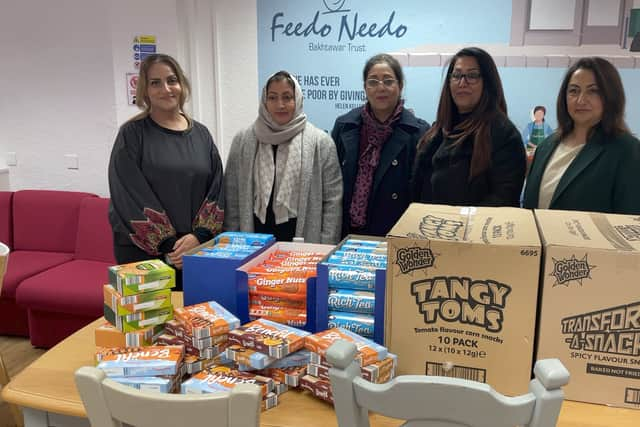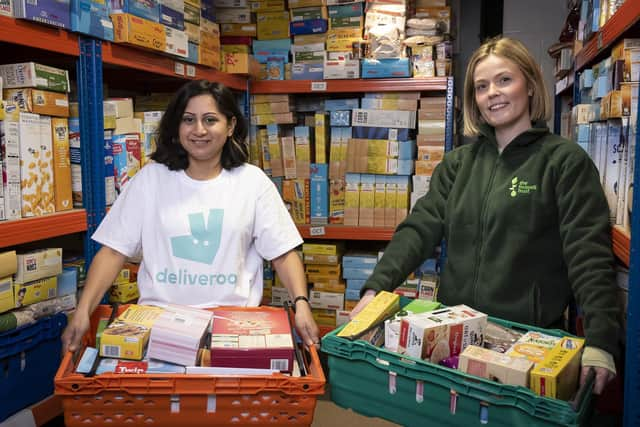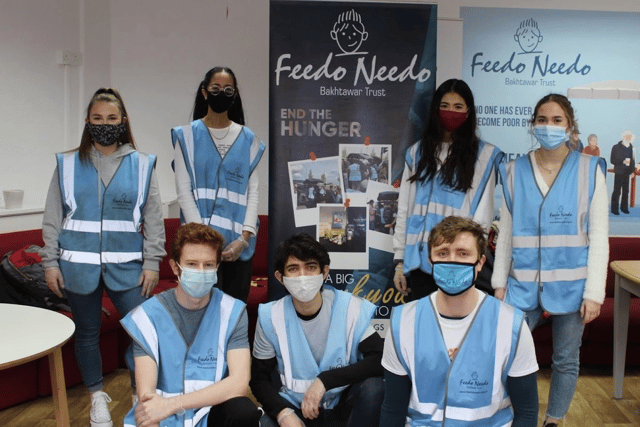Why more than 16,000 food bank parcels were given to Birmingham children in the last year
This article contains affiliate links. We may earn a small commission on items purchased through this article, but that does not affect our editorial judgement.
and live on Freeview channel 276
Food banks in Birmingham have given out 53,319 parcels to adults and children in the last year - that’s 29% more than before the pandemic.
For every 100,000 people in the city, a total of 4,500 have received help to feed themselves from 1 April 2021 to 31 March 2022.
Advertisement
Hide AdAdvertisement
Hide AdThe food parcels were handed out from 15 distribution centres across the city. Alarmingly the figure includes 16,081 children who received the aid.
Birmingham ranks twelfth highest out of 23 West Midlands local authority areas. Worcester is the highest with 11,332 people per 100,000 people given food parcels - an increase of 38% before the pandemic.
On average across the UK the Trussell Trust food bank figures show there has been a 14% increase in people receiving the parcels since 2019/20, before the pandemic due to the escalating cost of living crisis.


What does the immediate future look like as the cost of living crisis continues?
Food bank managers are warning of an accelerating crisis across the UK following the cut to Universal Credit, as the cost of living continues to soar. Need for food banks in the Trussell Trust network has accelerated throughout the past six months:
Advertisement
Hide AdAdvertisement
Hide Ado July – September 2021 saw a 10% increase in comparison to the same period in 2019
o October – December 2021 saw a 17% increase in comparison to the same period in 2019
o January – February 2022 saw a 22% increase in comparison to the same period in 2020
As inflation continues to increase and rising bills are putting pressure on families across the country, the Trussell Trust says its network expects the need for emergency food to rise further still, over the coming months and beyond. One food bank manager said: “The people who come in are telling me they’re scared. People are beside themselves about what the next six months will bring.”
Loading....
What has caused such an increase in the need for help to get fed in the UK?
Advertisement
Hide AdAdvertisement
Hide AdA spokesperson for the charity explained: “The UK government has failed to create any security for people on the lowest incomes, allowing the value of social security to fall dramatically in real terms while prices rise, the charity warns.
“In October the Chancellor removed £20 a week from low-income families across the country, the largest cut to welfare since the Second World War. And in his Spring Statement he rejected calls for benefits to be brought in line with the current rate of inflation to better reflect the true cost of living, the charity highlights. This is on top of a five-year freeze on benefits rates which means these payments are worth 11% less than they were a decade ago.
“With the energy price cap rise just starting to bite for most people at risk from financial hardship – who cannot work or work longer hours due to disability, caring responsibilities or mental health issues – there is very little protection ahead.
“Food bank staff and volunteers will always do all they can to help people in their communities, they do this every day - but they cannot and should not be picking up the pieces of government inaction, particularly with a crisis of this scale.”


Is it too late?
Advertisement
Hide AdAdvertisement
Hide AdThe Trussell Trust says there is still time for politicians to turn this situation around. It says governments at all levels must use their powers and take urgent action now to strengthen the social security system so it keeps up with the true cost of living and helps prevent hundreds of thousands more families being forced through the doors of food banks.
It explains that for the UK government, that means as a first step increasing benefits payments by at least 7%, so more people are able to afford the essentials we all need in life to get by.
The charity says in the longer term, the government must introduce a commitment in the benefits system to ensure that everyone has enough money in their pockets to be prevented from falling into destitution – which means not being able to afford the essentials we all need to eat, stay warm and clean.


Emma Revie, chief executive of the Trussell Trust, said:“People are telling us they’re skipping meals so they can feed their children. That they are turning off essential appliances so they can afford internet access for their kids to do their homework.
Advertisement
Hide AdAdvertisement
Hide Ad“How can this be right in a society like ours? And yet food banks in our network tell us this is only set to get worse as their communities are pushed deeper into financial hardship. No one’s income should fall so dangerously low that they cannot afford to stay fed, warm and dry.
“There is still time for the UK government to do the right thing. We are calling on the UK government to bring benefits in line with the true cost of living. As an urgent first step, benefits should be increased by at least 7%, keeping pace with increases in the cost of living. In the longer term, we need the government to introduce a commitment in the benefits system to ensure that everyone has enough money in their pockets to be prevented from falling into destitution.”
“By failing to make benefits payments realistic for the times we face, the government now risks turning the cost of living crisis into a national emergency.”


What has the government said about the Trussell Trust findings?
A Government spokesperson said: “We recognise the pressures on the cost of living and we are doing what we can to help, including spending £22 billion across the next financial year to support people with energy bills and cut fuel duty.
Advertisement
Hide AdAdvertisement
Hide Ad“For the hardest hit, we’re putting an average of £1,000 more per year into the pockets of working families on Universal Credit, have also boosted the minimum wage by more than £1,000 a year for full-time workers and our Household Support Fund is there to help with the cost of everyday essentials.”
A message from the editor:
Thank you for reading. BirminghamWorld is Birmingham’s latest news website, championing everything that is great about our city - reporting on news, lifestyle and sport. We want to start a community among our readers, so please follow us on Facebook,Twitter and Instagram, and keep the conversation going.
Comment Guidelines
National World encourages reader discussion on our stories. User feedback, insights and back-and-forth exchanges add a rich layer of context to reporting. Please review our Community Guidelines before commenting.
